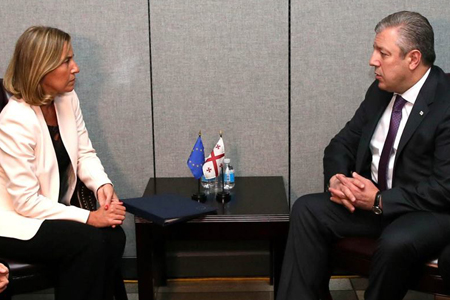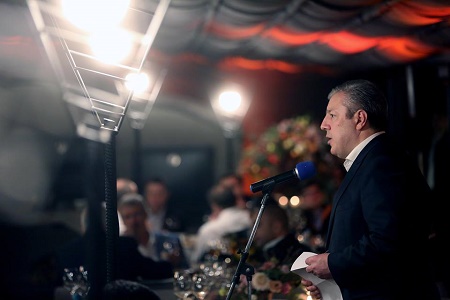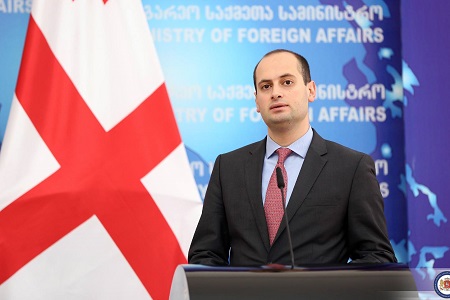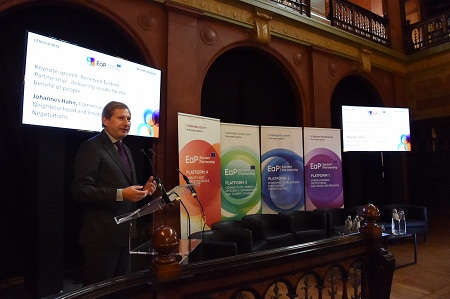EU report praises the way Georgia implements reforms

Georgia is successfully delivering on its reform commitments, says the latest report from the European Union (EU).
It stresses that Georgia's implementation of its Association Agenda in 2017 confirms the country's commitment to political association and economic integration to the EU.
Today, the European External Action Service and the European Commission released the second Joint Association Implementation Report on Georgia, highlighting the details of Georgia’s EU-integration progress.
The report says that, with its sustained reform efforts and ambition to develop further its relations with the European Union, Georgia has consolidated its position of a key and strategic partner in the region.
Upon the release of the report, EU high officials also assessed how Georgia fulfils its EU-integration homework.
"The European Union and Georgia have invested a lot in a strong partnership that is proving deeper day by day and that is bringing great benefits to our citizens. Since last March, Georgian citizens have been able to travel without a visa to the Schengen Area for short stays, we see more exchanges between our students than ever before, and there are more possibilities for trade among our businesses”, said the EU High Representative for Foreign Affairs and Security Policy, Vice-President of the European Commission, Federica Mogherini.
She added that today’s report demonstrates clear progress in Georgia's reform agenda.
Mogherini pledged that the EU will continue to support the work that has still to be done in several important areas and will stay committed to the thorough and continued implementation of the Association Agenda.
Positive trends were stressed by the Commissioner for European Neighbourhood Policy and Enlargement Negotiations, Johannes Hahn as well.
"We continue to see positive results of the implementation of the Association Agreement”, he said.
Hahn stressed that the revised EU-Georgia Association Agenda provides a practical framework of priorities for joint work until 2020.
"The approximation to EU standards and regulations is allowing Georgia to become more and more an actor in the international market. The EU is Georgia's largest trade partner and 2017 looks to have brought further increases. The accession of Georgia to the Energy Community Treaty as a full contracting party in July 2017 was another milestone bringing the EU and Georgia closer”, he said.
Today’s report assesses the state of play of Georgia's implementation of its Association Agenda since the EU-Georgia Association Council of December 2016. It focuses on key developments and reforms undertaken in line with the strategic priorities agreed between the EU and Georgia.
According to the report, Georgia has implemented a number of reforms, strengthening democracy and the rule of law, as well as other key areas in the EU-Georgia Association Agreement.
Overall, commitments stemming from the Association Agreement, including its Deep and Comprehensive Free Trade Area (DCFTA), have been implemented in line with agreed timelines, the document says. It highlights that Georgia’s democratic institutions have been consolidated and a comprehensive legislative framework for human rights and anti-discrimination has been adopted.
The report underlines the benefits brought to the EU and Georgia since the start of the provisional application of the DCFTA in September 2014. It mentions that with the progressive approximation of technical regulations and standards with those of the EU, Georgia has been increasingly able to strengthen its participation in international value chains.
It says that in 2016, the EU was the largest trade partner of Georgia with 30 percent share in its overall trade and that preliminary data on 2017 suggest a continuation of this trend, with bilateral trade remaining strong.
The document underlines that the first semester of 2017 saw an increase in EU imports from Georgia by 56 percent, and an increase of EU exports to Georgia by 2 percent compared to the first semester of the previous year.
The next EU-Georgia Association Council meeting is scheduled to take place on December 8.
 Tweet
Tweet  Share
Share








